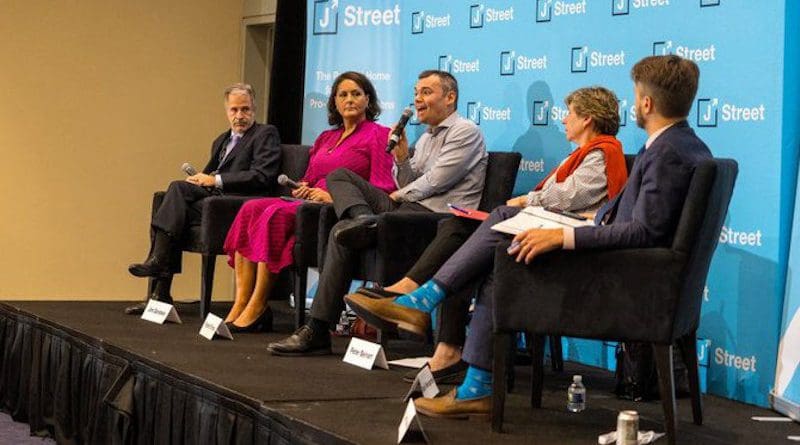Moderate Israelis Can Help Achieve Two-State Solution – OpEd
By Ray Hanania
The strongest force pushing for a two-state solution to the Israeli-Palestinian conflict is not coming from the Arab world or the Arab American community — it is coming from the Jewish community.
Every Arab and Muslim conference held in America discusses the suffering of the Palestinian people and the need for justice, but few talk about how to achieve that goal. So it is ironic that the loudest voice calling for a two-state solution is J Street, which advocates for Jewish rights and for peace.
Not surprisingly, many Arabs don’t support J Street, despite the fact it recognizes Palestinian rights and invites Palestinian activists to attend and speak at its conferences. Many activists oppose J Street as strenuously as they oppose the powerful American Israel Public Affairs Committee, which coordinates political action committees to focus funding in support of pro-Israel elected officials and to oppose groups that criticize Israel’s policies. J Street is one of the few organizations pushing for peace based on compromise. Another is the New Israel Fund, which was represented at this week’s J Street annual conference.
I also attended the virtual conference on behalf of Arab News. I listened as former Israeli Prime Minister Ehud Olmert and Palestinian President Mahmoud Abbas spoke about how they negotiated peace, but failed because of the changes brought about at the Israeli ballot box. Ultimately, the majority of Israeli voters turned away from the peace process and elected Benjamin Netanyahu, a political extremist who openly opposed the two-state solution and has, for nearly 20 years now, embraced a policy of creeping annexation.
One of the problems for the pro-peace movement is that both the Israelis and the Palestinians are divided over how peace can be achieved. Many Palestinians support the one-state solution, which hopes to have a “secular, democratic state” in which “Muslims, Christians and Jews” would live “equally.” That was the definition long held by the Palestine Liberation Organization (PLO) and its many coalition members, until the PLO and its Chairman Yasser Arafat signed the Oslo Accords from 1993.
The Israelis are not currently as divided as the Palestinians and are leaning hard to the political right, opposing Palestinian statehood by virtue of their repeated votes to re-elect Netanyahu as their prime minister.
During the J Street conference, speaker after speaker noted that, while Netanyahu has again been given the mandate to try and form a coalition government, if he fails his successor would not be a leading advocate for two states, but rather the Netanyahu-like extremist Naftali Bennett. Bennett is so anti-Palestinian that, in February, he compared the Palestinian Authority government to Daesh.
While the movement for peace may not be strong enough to take back control of Israel’s government, it has not vanished either. The J Street conference showed us that the movement has not abandoned peace based on compromise, as Netanyahu and Bennett have. In fact, many speakers saw a silver lining in the peace accords recently signed between Israel and the UAE, Bahrain, Morocco and Sudan, noting that they make it more likely there will be a reinvigoration of the idea of peace based on compromise and the two-state solution.
Olmert said that he believed peace was still possible and that all of the Israeli actions that are cited as undermining peace can be reversed, given the right circumstances. This message was echoed by Ayman Odeh, the Palestinian leader of the Arab Joint List, which has won as many as 15 seats in the Israeli Knesset. He added, insightfully, that nothing is permanent in politics. He said that any law can be changed and that a Palestinian state based on the 1967 borders can be achieved.
Elections are also not permanently decisive. They only reflect one particular moment in time. The election power of the Palestinian citizens of Israel is growing, although it may not be enough to bring about change any time soon.
Many speakers at the J Street conference concluded that, while the two-state solution is not dead, it may be some time before the political environment changes enough to push the anti-peace activists and leaders aside and see them replaced with pro-peace leaders. To do that, we need to see the Palestinian diaspora come together and support an achievable peace agenda, which is the two-state solution. And we need to see the diaspora come to terms with the growing power of the Palestinian citizens of Israel.
Most importantly, Palestinians need to end the xenophobic attitude that says we can’t partner or deal with Israelis, or that “normalizing” relations with pro-peace Israelis is wrong. Palestinians need to get their act together and partner with groups like J Street and the New Israel Fund to create a coalition that supports peace based on compromise and the two-state solution. The only way to do that is to silence the extremist voices in our community and empower both the Israeli and Palestinian moderates.

